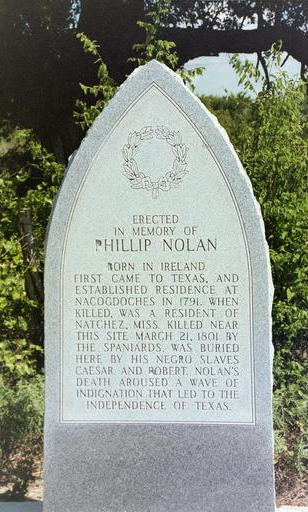|
A
few generations ago, the name of Philip Nolan, who led one of the
first Anglo intrusions into Spanish Texas, would have been familiar
to every school child, but probably for the wrong reason: Edward Everett
Hale's main character in The Man Without A Country was named Philip
Nolan.
Hale used Nolan's name because it was well known, but the character
in his novel shared little else with the real Philip Nolan. The fictional
character condemned his country in a fit of pique and was condemned
to spend the remainder of his life aboard a naval vessel and never
again hear the words "United States of America." The real Philip Nolan
helped his country expand in the Southwest. |
 |
Nolan
came to Texas during the 1790s. He presented
a plan to the Baron de Carondelet, governor of Louisiana, to travel
to Texas to capture mustangs, or wild
horses, and market them in Louisiana. The plan was approved. For a
nation that still moved by horsepower, the likelihood of success for
the venture was great.
Nolan and his employees made several trips to Texas,
but Spanish officials, who had informants in New Orleans, became suspicious
of him. They thought Nolan spent entirely too much time with General
James Wilkinson, commander of United States forces along the frontier
with Spain. Spanish authorities noted that in addition to capturing
mustangs, in Texas, Nolan also spent
a great deal of time exploring and making maps. Combining what was
known of these activities and his closeness to Wilkinson, Governor
Juan Bautista de Elguezabal, ordered Nolan's arrest in 1800.
Nolan returned to Texas on another expedition
and was killed in a fight with Spanish soldiers near present Waco,
Texas. The men accompanying Nolan were captured and led first
to Nacogdoches,
where they were held briefly in the Stone House, or Old
Stone Fort, erected by the town's founder, Antonio
Gil Y'Barbo, in 1779. Despite the distance, it was the only Spanish
outpost in East Texas.
The men then were marched to Mexico,
and there condemned for violations of Spanish law. Their punishment
called for one prisoner to be executed and the other eight to serve
ten years at hard labor. The men threw dice, with the lowest number
judged the loser, which was poor Ephraim Blackburn. One of Nolan's
men, Peter Ellis Bean, was
a true survivor. Bean literally talked his way out of prison. He convinced
authorities to release him so he could help them suppress a revolt;
defected, and then convinced the revolutionaries to send him to New
Orleans for supplies.
As for Nolan, we can credit him and men like him with "making news"
in the United States that quickened the interest of other Americans
about building futures in Texas.
All
Things Historical
July, 2003 column
A syndicated column in over 40 East Texas newspapers
Copyright Archie P. McDonald
This column is provided as a public service by the East Texas Historical
Association. Archie P. McDonald is director of the Association and
author of more than 20 books on Texas. |
|
|
